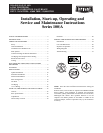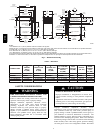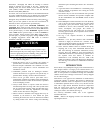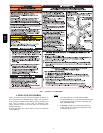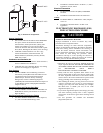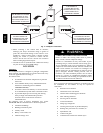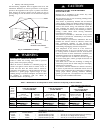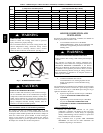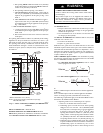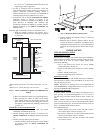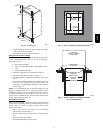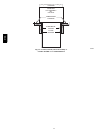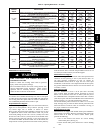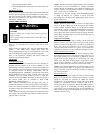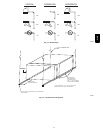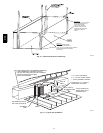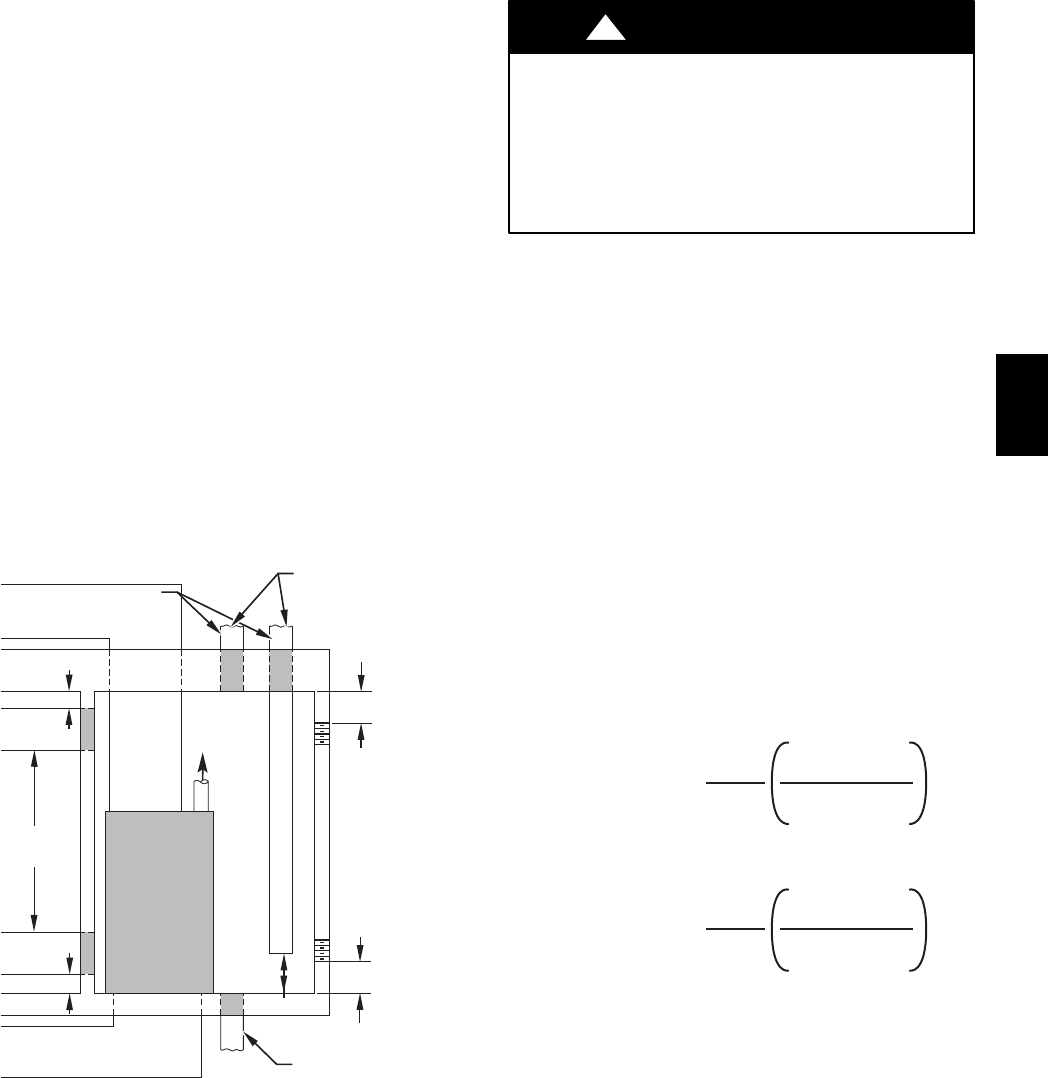
9
a. Oneopening MUSTcommence within 12--in. (300 mm)
of the ceiling and the second opening MUST commence
within 12--in. (300 mm) of the f loor.
b. Size openings and ducts per Fig. 7 and Table 2.
c. TWO HORIZONTAL DUCTS require 1 square inch of
free area per 2,000 Btuh (1,100 mm
2
/kW) of combined
input for all gas appliances in the space per Fig. 7 and
Table 2.
d. TWO OPENINGS OR VERTICAL DUCTS require 1
square inch of free area per 4,000 Btuh (550 mm
2
/kW)
for combined input of all gas appliances in the space per
Fig. 7 and Table 2.
3. ONE OUTDOOR OPENING requires:
a. 1 square inch offree areaper 3,000 Btuh (734 mm
2
/kW)
for combined input of all gas appliances in the space per
Table 2 and
b. Not less than the sum of the areas of all vent connectors
in the space.
The opening shall commence within 12” (300 mm) of the ceiling.
Appliances in the space shall have clearances of at least 1” (25
mm) from the sides and back and 6” (150 mm) from the front.
The opening shall directly communicate with the outdoors or
shall communicate through a vertical or horizontal duct to the
outdoors or spaces (crawl or attic) t hat freely communicate with
the outdoors.
1 SQ IN .
PER
4000
BTUH*
DUCTS
TO
O UTDOORS
1 SQ IN.
PER 4000
BTUH*
C IRCULA TING
AIR DUCTS
VENT
THR OUGH
R OOF
D
B
A
C
E
1 SQ IN.
PER 4000
BTUH*
DUCT
TO
OUTDOORS
CIRCULA TING AIR DUCT S
1 SQ IN.
PER 2000
BTUH*
1 SQ IN.
PER 2000
BTUH*
DUCT S
TO
OUTDOORS
12 ″ MAX
12 ″ MAX
12 ″ MAX
12 ″
MAX
12 ″
MAX
OUTDOORS
1 SQ IN .
PER
4000
BTUH*
F
G
CLEARANCE IN FRONT
OF COMB USTION AIR
OPENINGS SHALL BE
AT LEAST 3 IN .
(305mm)
(305mm)
(305mm)
(305mm)
(305mm)
(76mm)
*Minimum dimensions of 3 in. (76 mm).
NOTE: Use any of the following combinations of openings:
A&B, C&D, D&E, F&G
A03174
Fig. 7 -- Air for Combustion, Ventilation, and Dilution from
Outdoors
Indoor Combustion Air -- NFPA & AGA
Standard and Known --Air-- Infiltration Rate Methods
Indoor air is permitted for combustion, ventilation, and dilution,
if the Standard or Known--Air--Infiltration Method is used.
CARBON MONOXIDE POISONING HAZARD
Failure to follow this warning could result in death and/or
personal injury.
Many homes require air to be supplied from outdoors for
furnace combustion, ventilation, and dilution of flue gases.
The furnace combustion air supply must be provided in
accordance with this instruction manual.
!
WARNING
The Standard Method:
1. The space has no less volume than 50 cubic feet per 1,000
Btuh of the maximum input ratings for all gas appliances
installed in the space and
2. The a ir infiltration rate is not known to be less than 0.40
air changes per hour (ACH).
The K nown Air Infiltration Rate Method shall be used, if the
infiltration rate is known to be:
1. Less than 0.40 ACH and
2. Equal to or greater than 0.10 ACH
Infiltration rates greater than 0.60 ACH shall not be used. The
minimum required volume of the space varies with the number of
ACH and shall be determined per Table 3 or Equations 1 and 2.
Determine the minimum required volume for each appliance in
the space and add the volumes together to get the total minimum
required volume for the space.
Table 3--Minimum Space Volumes were determined by using
the following equations from the National Fuel Gas Code ANSI
Z223.1-- 2006/NFPA 54-- 2006, 9.3.2.2:
1. For other than fan--assisted appliances, such as a draft
hood--equipped water heater:
Volume
Other
=
21ft
3
ACH
I
other
1000 Btu/hr
A04002
2. For fan--assisted appliances such as this furnace:
Volume
Fan
=
15ft
3
ACH
I
fan
1000 Btu/hr
A004003
If:
Iother = combined input of all other than fan --assisted appliances
in Btuh/hr
Ifan = combined input of all fan--assisted appliances in Btuh/hr
ACH = air changes per hour (ACH shall not exceed 0.60.)
The following requirements apply to the Standard Method and to
the Known Air Infiltration Rate Method.
1. Adjoining rooms can be considered part of a space if:
a. There are no closable doors between rooms.
b. Combining spaces on same floor level. Each opening
shall have free a rea of at least 1 in.
2
/1,000 Btuh (2,000
mm
2
/kW) of the total input rating of all gas appliances
in the space, but not less than 100 in.
2
(0.06 m
2
). One
opening shall commence within 12” (300 mm) of the
ceiling and the second opening shall commence within
12” (300 mm) of the floor. The minimum dimension of
air openings shall be at least 3 in. (80 mm). (See Fig. 8.)
c. Combining space on different floor levels. Thevolumes
of spaces on different f loor levels shall be considered as
communicating spaces if connected by one or more
permanent openings in doors or floors having free area
313A



